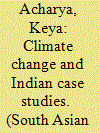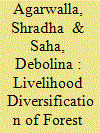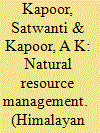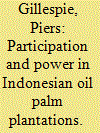| Srl | Item |
| 1 |
ID:
095335


|
|
|
| 2 |
ID:
144706


|
|
|
|
|
| Summary/Abstract |
Based on primary and secondary data, this paper provides a qualitative account of current changes in the pattern of natural resource management as a result of resource degradation and conflict in the Borana rangelands of southern Ethiopia. Population pressure, recurrent drought and the depleted carrying capacity of pastoral resources, as well as the encroachment of neighbouring ethnic groups, present the Borana community with a significant challenge. The diminishing resilience of traditional politico-judicial institutions under the famous Gada system often result in the rise of new forms of land use such as farming and private enclosures, which compete with the traditional communal tenure system. The gradual collapse of traditional norms and value systems and the apparent inefficiency in the formal administrative structures have exacerbated the problems of resource degradation and conflict between multiple resource-users.
|
|
|
|
|
|
|
|
|
|
|
|
|
|
|
|
| 3 |
ID:
080309


|
|
|
|
|
| Publication |
2007.
|
| Summary/Abstract |
In this article the factors affecting the attitudes and preferences of households regarding natural resource management in the Abbottabad district of Pakistan are analysed. The findings suggest that non-government organizations were doing better than government agencies in motivating the user groups towards sustainable use and management of natural resources through local organizations. However, it depends on the households' socio-economic status and its linkage with their livelihoods to participate in natural resource management activities. The study can assist policymakers by identifying the key areas for the implementation of their programmes related with natural resource management activities through community participation
|
|
|
|
|
|
|
|
|
|
|
|
|
|
|
|
| 4 |
ID:
184126


|
|
|
|
|
| Summary/Abstract |
The forest as an ecosystem plays a vital role in protecting the environment and meeting indispensable human needs. Restrictions on forestry activities for safeguarding the environment and seasonality in collection often count for vulnerable livelihood of the forest-fringe dwellers. This paper is an attempt to assess the existing opportunities for livelihood diversification of the forest dwellers residing at the Simlipal National Park region, India, through the Herfindahl–Hirschman Index; and to determine the key factors responsible for the scopes and realization of livelihood diversification through econometric modeling. The analysis is done across blocks with having different forest-zonal geographies and human characteristics to comprehend and ensure sustainable livelihood for a better future.
|
|
|
|
|
|
|
|
|
|
|
|
|
|
|
|
| 5 |
ID:
078743


|
|
|
| 6 |
ID:
117139


|
|
|
|
|
| Publication |
2012.
|
| Summary/Abstract |
Participation is commonly accepted to be a process that brings stakeholders together to define issues and create mutually beneficial outcomes. In the fields of development and natural resource management, participation is such a widely accepted part of policy that it is rare to find a project or programme that does not exhort the practice of participation and stakeholder engagement. However, despite the considerable weight of orthodoxy advocating greater participation and stakeholder engagement in development, the participative processes and power relations underpinning such engagement are rarely analysed in careful detail. This is particularly the case with oil palm plantations in frontier Indonesia and the interactions between the principal stakeholders at the plantation-community level. There has been minimal analysis to date appraising how such stakeholders interact in relation to a plantation, and there is limited description outlining the divergent viewpoints from such stakeholders. The paper argues that one local stakeholder group, oil palm smallholders, usually possess some agency in their decision-making and interactions with a plantation organisation but that existing structural and informal modes of interaction often limit the transformative potential of participation for all stakeholders.
|
|
|
|
|
|
|
|
|
|
|
|
|
|
|
|
| 7 |
ID:
103189


|
|
|
|
|
| Publication |
2010.
|
| Summary/Abstract |
Small island literature is vast in focus and aim, and is rooted in many different disciplines. The challenge is to find common grounds for researching small islands conceptually and theoretically. The aim of this article is to comment on how to research small islands, including a discussion on contemporary theories of nissology and conceptual analytical frameworks for island research. Through a review of selected case-study-based island literature on changing livelihoods coming out of the South Pacific, we wish to illustrate and discuss advantages of finding common grounds for small island studies. The focus is on two dimensions of island livelihood, migration and natural resource management, both of which are significant contributors in making island livelihoods and shaping Pacific seascapes. We argue that there is still a substantial lack of studies targeting small island dynamics that are empirical and interdisciplinary in focus and link socio-economic and ecological processes of small island societies at temporal and analytical scales.
|
|
|
|
|
|
|
|
|
|
|
|
|
|
|
|
| 8 |
ID:
081719


|
|
|
| 9 |
ID:
177265


|
|
|
|
|
| Summary/Abstract |
The nineteenth-century Ottoman Empire witnessed a gradual change in the forestry regime. In response to the intensifying struggle over forest resources in the Eastern Mediterranean, the Ottoman government introduced a series of reforms aimed at exerting more direct control over forests. In the implementation of these reforms not only did opposing interests clash at the central level but local interest groups involved in regional trade networks also appeared as influential actors. Focusing on a lawsuit related to forest crimes committed in the Teke region in the beginning of the 1890s, this paper discusses how modern, bureaucratized forestry practices were negotiated at the local level. By uncovering a complicated interaction among forest officials at the center and in the provinces, as well as timber merchants, this paper considers smuggling an integral component of politics over natural resources.
|
|
|
|
|
|
|
|
|
|
|
|
|
|
|
|
| 10 |
ID:
180288


|
|
|
|
|
| Summary/Abstract |
The nineteenth-century Ottoman Empire witnessed a gradual change in the forestry regime. In response to the intensifying struggle over forest resources in the Eastern Mediterranean, the Ottoman government introduced a series of reforms aimed at exerting more direct control over forests. In the implementation of these reforms not only did opposing interests clash at the central level but local interest groups involved in regional trade networks also appeared as influential actors. Focusing on a lawsuit related to forest crimes committed in the Teke region in the beginning of the 1890s, this paper discusses how modern, bureaucratized forestry practices were negotiated at the local level. By uncovering a complicated interaction among forest officials at the center and in the provinces, as well as timber merchants, this paper considers smuggling an integral component of politics over natural resources.
|
|
|
|
|
|
|
|
|
|
|
|
|
|
|
|